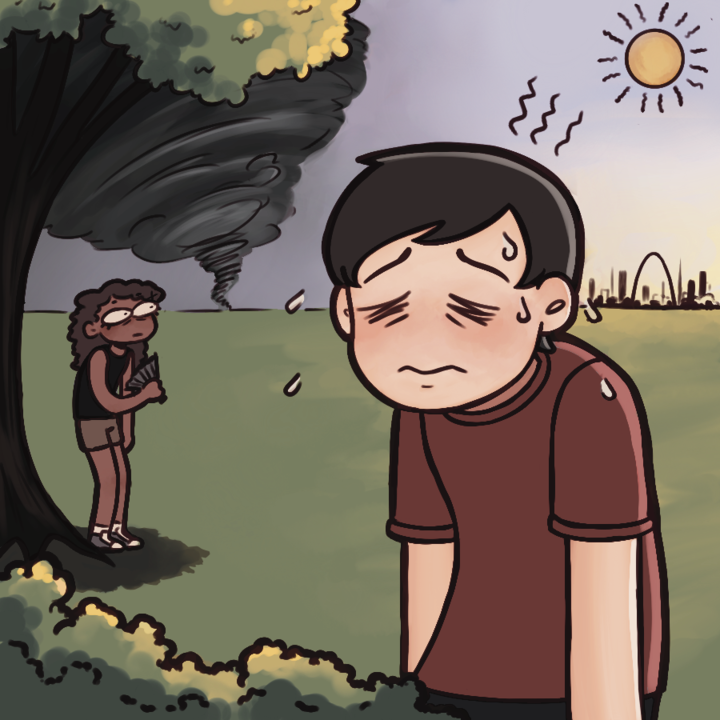News
It’s getting hotter: anxiety and hope among WashU students, staff, and faculty

Illustration by Elma Ademovic
With summer right around the corner, the St. Louis region will likely face some of the highest temperatures on record. Millions of Americans are subject to rising temperatures, and Washington University and the St. Louis region are no exception.
The impacts of climate change are evident in St. Louis, where the temps this February broke several heat records for the region. 2023 was the second-hottest year on record, and seven out of the 10 hottest years for the St. Louis region have occurred since 2000.
For Director of Sustainability Phil Valko, climate change is a threat that WashU is addressing proactively. In an interview with Student Life, Valko detailed many of the University’s initiatives for dealing with climate change.
According to Valko, upgrading building efficiency has been one of the University’s primary goals to reduce carbon impact, including requiring more-efficient building envelopes, or the exterior shell of the building.
“We recently updated our design guidelines for buildings to require more-efficient building envelopes, and we work with engineering teams to include modeling under future climate conditions,” Valko said. “We truly are planning the buildings for the future in which the temperature regime is different.”
Valko says another goal is to plant more trees, which is an effective way of lowering surface temperatures and improving air quality.
“The Danforth Campus is a Level II Arboretum, and the University has added well over a thousand trees in the last decade, with a focus on biodiverse species that will be resilient under future climate conditions,” Valko said. “We have the opportunity with Mudd Field to add many more trees around that section of campus…we’re being really thoughtful and strategic about adding future tree canopy to provide shade so that our outdoor spaces will be much more comfortable.”
For some members of the WashU community, however, the University is not doing nearly enough to address the impacts of rising temperatures on WashU or the broader region.
Dr. Bret Gustafson, Professor of Sociocultural Anthropology at WashU, believes the impacts of rising temperatures go well beyond higher temperatures and that climate change exacerbates fundamental health and economic inequalities that are particularly present in the St. Louis area.
“Higher temperatures intensify threats to vulnerable populations…a lot of people live in electricity poverty,” Gustafson said. “Because wealth and St. Louis has to do with race, it’s impacting Black and brown communities more than more affluent communities.”
Other U.S. cities are considering heat mitigation programs, hiring heat tsars, planting trees, and providing resources for people experiencing homelessness. St. Louis city and county offer cooling shelters and have a modest tree-planting program, but experts indicate that much more needs to be done to protect vulnerable and marginalized communities in the St. Louis region from rising temperatures.
Gustafson believes that WashU has the responsibility to push for more-aggressive clean energy goals to better support marginalized St. Louisans who are experiencing increasingly high temperatures.
“The University is in a spot to make more positive change [than] it’s currently doing,” Gustafason said. “When something affects the University, like [Missouri politicians] cutting Medicare…that hit the University’s bottom line, and they finally spoke out because Barnes [Jewish Hospital] lives off of Medicare. Why can’t we do it in terms of renewable energy?”
Gustafson frames this decision as a turning point and believes it is time for action beyond what the University is currently pursuing.
“We’re at a point in the game where we don’t need any more research,” Gustafson said. “We need to stop burning fossil fuels.”
First-year Meghan Jachna, Vice President of Advising on the Student Sustainability Board (SSB), echoed Gustafason’s sentiment that urgent action is needed.
“These instances of extreme heat really just show that our environment is reaching a breaking point,” Jachna said. “We are emitting way too many greenhouse gasses, and our carbon emissions are getting to the point where the climate system is going to shut down imminently.”
Jachna also added that SSB and the Office of Sustainability have had trouble collaborating with WashU’s Dining Services to get reusable containers in the dining halls.
“We tried to get reusable takeout containers [implemented], and that kind of failed…there wasn’t a lot of good communication between the Office of Sustainability services and Dining, but I think that […] maybe in the future, there’ll be potential to get that to work,” Jachna said. “I think that’s a lot of other areas where [the University] has had good sustainability efforts.”
In response to students and faculty who say WashU is not doing enough to address climate issues, Valko invited those committed to making WashU a more sustainable place to join him and the Office of Sustainability in the work they do.
“We are doing a lot, and we have plenty more that we will be tackling,” Valko said.“We have 16 student interns that work with the Office of Sustainability, and they are working on a whole range of issues, from food sustainability to vehicle electrification.”
Additional reporting done by Elizabeth Stump.
